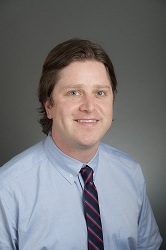Dr. John S. Brownstein – PECASE Recipient 2010
A Platform for Modeling the Global Impact of Climate Change on Infectious Disease (R01-LM010812)
By receiving a 2010 PECASE, John S. Brownstein, Ph.D., has been recognized for his ground-breaking research on the global impact of climate change on infectious disease. Trained as an epidemiologist in the Department of Epidemiology and Public Health at Yale University where he obtained his PhD., Dr. Brownstein completed his postdoctoral training at Children's Hospital Boston and Harvard Medical School.
Dr. Brownstein works on novel statistical modeling and medical informatics approaches for accelerating the translation of public health surveillance research into practice. His research focuses on two major areas: (1) the design, evaluation and implementation of public health surveillance systems and (2) statistical modeling of public health surveillance data to improve prevention and control activities. It has involved a variety of infectious diseases including malaria, dengue, HIV, West Nile virus, Lyme disease, RSV and influenza. His group is also leading the development of several novel disease surveillance systems, including HealthMap.org, an internet-based global infectious disease intelligence system.
Quotes
What do you think the impact of this award will have on your research career?

Dr. John S. Brownstein
This award is clearly the highlight of my professional career. The recognition alone is an incredible honor and helps to elevate not only my group's work but that of the overall field. The additional research support will enable us to further untangle the complex relationship between future climate conditions and infectious disease risk through the evaluation of novel data streams and the complex models required to make risk projections.
What is your best career advice to young investigators?
Being a successful PI requires the development of entrepreneurial skills. Try to be nimble in your approach to research and find the right mix between your interests and topics that are covered by funding agencies. Being nimble also means to not let your group get too big. Finding good people who can work quickly is infinitely better than developing a large empire. Don't assume that the path of other academics is the way to make things happen. I think the mold of the academic is changing. To be successful, you need to view your group as a startup, not different from any business operation.
What do you think might be the most likely (and meaningful) discovery to emerge in your field in the next five? Ten years?
Our work strives to understand the impact of the environment on emerging infectious diseases. Over the next decade, we can expect to have a more detailed understanding of how climate and landscape impact the biology of pathogens, vectors and hosts. This understanding will help contribute to a better characterization of high risk areas around the globe and hopefully more directed mitigation efforts.
Publications
Publications related to this grant include:
Brownstein JS. Using social media for disease surveillance. CNN. 2011 Aug 18.
Chan EH, Brewer TF, Madoff LC, Pollack MP, Sonricker AL, Keller M, Freifeld CC, Blench M, Mawudeku A, Brownstein JS. Global capacity for emerging infectious disease detection. Proc Natl Acad Sci U S A. 2010 Dec 14;107(50):21701-6.
Freifeld CC, Chunara R, Mekaru SR, Chan EH, Kass-Hout T, Ayala Iacucci A, Brownstein JS. Participatory epidemiology: use of mobile phones for community-based health reporting. PLoS Med. 2010 Dec 7;7(12):e1000376.
Brownstein JS, Freifeld CC, Chan EH, Keller M, Sonricker AL, Mekaru SR, Buckeridge DL. Information technology and global surveillance of cases of 2009 H1N1 influenza. N Engl J Med. 2010 May 6;362(18):1731-5.
Khan K, Freifeld CC, Wang J, Mekaru SR, Kossowsky D, Sonricker AL, Hu W, Sears J, Chan A, Brownstein JS. Preparing for infectious disease threats at mass gatherings: the case of the Vancouver 2010 Olympic Winter Games. CMAJ. 2010 Apr 6;182(6):579-83.
Last Reviewed: August 28, 2014

